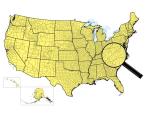Tag Archives : States
Sweden, Spending Restraint, and the Benefits of Obeying Fiscal Policy’s Golden Rule
When I first started working on fiscal policy in the 1980s, I never thought I would consider Sweden any sort of role model. It was the quintessential cradle-to-grave welfare state, much loved on the left as an example for America to follow. But Sweden suffered a severe economic shock in the early 1990s and policy […]
read more...Great Moments in Tax Enforcement
I’ll be first in line if there’s a contest over who thinks most strongly thatpoliticians are corrupt, or whether they can waste money in creative ways. But if somebody asserts that politicians are stupid, I’m going to argue on the other side. This isn’t because I’m a fan of elected officials. Far from it. However, having […]
read more...The Best State in America Is…?
What’s the best state in America? I’m not sure I can answer that broad question, but I can address the more narrow issue of which state has the most economic freedom. Last month, for instance, I shared some data from the Canada-based Fraser Institute which showed that South Dakota was America’s most laissez-faire state, followed by Tennessee, Delaware, […]
read more...New Mercatus Fiscal Ranking Shows the Real New Jersey Scandal
If you’re a libertarian, you generally don’t act and think like other people. Most folks, when they heard about Governor Christie’s bridge-closing scandal, focused on the potential political ramifications. But not me. My immediate reaction was to think that the problem could have been avoided if the bridge and its various entry points were privately […]
read more...If You Want Jobs and Growth, Keep in Mind that Obamanomics also Doesn’t Work on the State Level
The Tax Foundation in Washington does some great work on fiscal issues, but I also admire their use of maps when they want to show how various states perform on key indicators. They’re best known for “Tax Freedom Day,” which measures how long people have to work each year before they’ve earned enough to satisfy […]
read more...End the Federal Subsidy for Big State Governments
The relationship between federal and state governments – the division of power between the two levels being known as federalism – is an integral part of the American constitutional system. Federalism uses separate and competing spheres of sovereignty to check the growth and power of government as a whole. Unfortunately, that system has been steadily […]
read more...Why Tax Migration and Federalism Mean Doom for Left-Wing States such as New York, California, and Illinois
Maybe this means I’m not a nice person (notwithstanding my high score for tenderness in a recent test), but I can’t help but be happy when I read bad news about fiscal policy in high-tax welfare states. And because I’m a huge fan of tax competition, I get even happier when I find out that […]
read more...Which State Has the Most Self-Reliant People?
Back in 2010, I put together a “Moocher Index” as a rough measure of which states had the highest levels of welfare dependency after adjusting for poverty rates. My goal was to answer this question. Is there a greater willingness to sign up for income redistribution programs, all other things being equal, from one state […]
read more...Final Score: Dwight Howard 8,000,000 – Jerry Brown 0
feel sorry for the people of California. They’re in a state that faces a very bleak future. And why does the Golden State have a not-so-golden outlook? Because interest groups have effective control of state and local political systems and they use their power to engage in massive rip-offs of taxpayers. One of the main […]
read more...Why the So-Called Marketplace Fairness Act Is a Misguided Expansion of Power for State Governments
I’m either a total optimist or a glutton for punishment. I recently explained the benefits of “tax havens” for the unfriendly readers of the New York Times. Now I’m defending a different form of tax competition for CNN, another news outlet that leans left. In this case, the topic is whether states can reach beyond […]
read more...

